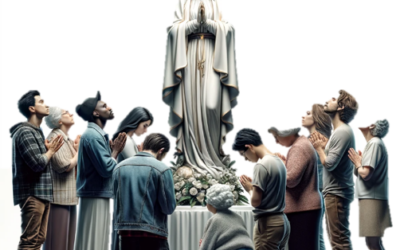The Roman Catholic Church often calls Mary the “mother of God.” But, what does that mean? Are the Catholics saying that Mary is the mother of the Trinity? Of course not. They say Mary is the mother of the person of Christ who has two natures, divine and human. The problem here is that in Catholicism, Mary is exalted to such a high degree, that they have woven into that idea Jesus will listen to Mary. So, Catholics pray to Mary and seek her to influence Jesus. This is false teaching.
“Since Mary is Jesus’ mother, it must be concluded that she is also the Mother of God: If Mary is the mother of Jesus, and if Jesus is God, then Mary is the Mother of God. There is no way out of this logical syllogism, the valid form of which has been recognized by classical logicians since before the time of Christ.”1
There is a sense in which the syllogism is true, but also another in which it is not. Let’s take a look.
Logical Fallacy
A syllogism is a set of premises with a conclusion. Here is their syllogism about Mary…
- Mary is the mother of Jesus.
- Jesus is God.
- Therefore, Mary is the mother of God.
Within this syllogism is the fallacy of equivocation. This fallacy occurs when a word or words change meaning in the usage of an argument.
- Mary is the mother of Jesus.
- Response: This is definitely true as is verified in Scripture. The term “mother” must refer to the biological sense of Jesus because Mary did not precede the Word that became flesh (John 1:1, 14), nor is she the author of his divine essence.
- Jesus is God.
- Response: When we say that Jesus is God, we are affirming that Jesus has a divine nature as well as a human nature (see Hypostatic Union). Therefore, the word “God” here must refer to the divine nature, the divine essence.
- Therefore, Mary is the mother of God.
- Response: In what sense is the term “God” used here? Does it mean God in the divine essence? Or does it mean God as a Trinity? Also, in what sense is the word “mother” used here? Does it mean that she is the mother of the divine nature? If so, it cannot mean that she’s the mother in the sense of being before the divine nature the same way that all mothers are before their offspring. It cannot mean that she is in a superior position than the divine Word since she is a creature. So, how is it meant? The lack of clarity is the problem.
Let me show you how the fallacy of equivocation works with an example that is more clear.
- Jesus is God.
- God is a Trinity.
- Jesus is the Trinity.
Do you see how lack of verification of terms results in confusion? Let me analyze this to show you where the problem lies.
- Jesus is God.
- In this sense, “God” means the divine essence.
- God is a Trinity.
- In this sense, “God” is describing the Trinity, one God in three distinct persons: Father, Son, and Holy Spirit.
- Jesus is the Trinity.
- The confusion arises in the use of the term “God” which means one thing in premise one and something different in premise two, even though it is the same word. This demonstrates the fallacy of equivocation.
As you can see, without clarification errors can arise from such ambiguous, undefined conclusions. Such is the case with the Roman Catholic Church which has attributed to Mary far more than what the Scriptures have declared.
Important Concerns
The initial concern that is associated with calling Mary the “mother of God” is the implication of superiority, and also a special position that she would then possess. Please consider the following problems associated with the exultation of Mary.
- Mary sits at the right hand of Christ: “…she is the supreme Minister of the distribution of graces. Jesus “sitteth on the right hand of the majesty on high” (Hebrews i. b.). Mary sitteth at the right hand of her Son…” (Pope Pius X, 1835-1914, Ad Diem Illum Laetissimum, 14).
- Mary is 2nd only to Jesus: “Mary has by grace been exalted above all angels and men to a place second only to her Son” (Vatican Council II, p. 421). “This mother…is waiting and preparing your home for you,” (Handbook for Todays Catholic, p. 31).
- Mary is the all holy one: “By asking Mary to pray for us, we acknowledge ourselves to be poor sinners and we address ourselves to the ‘Mother of Mercy,’ the All-Holy One,” (CCC 2677).
- Pray to Mary: “Mary is the perfect Orans (pray-er), a figure of the Church. When we pray to her, we are adhering with her to the plan of the Father,” (CCC 2679).
- Marian prayer is the epitome of the gospel: “The liturgical feasts dedicated to the Mother of God and Marian prayer, such as the rosary, are an epitome of the whole Gospel,” (par. 971).
- No Better way than to look to Mary: “After speaking of the Church, her origin, mission, and destiny, we can find no better way to conclude than by looking to Mary,” (CCC 972).
- Mary brings us the gifts of Eternal Life: Mary, “…by her manifold intercession continues to bring us the gifts of eternal salvation…(CCC par. 969)
Obviously, there are serious problems with the exultation of Mary by Roman Catholicism. Nevertheless, to the Roman Catholics’ credit, they do not assert that Mary is older than God or the source of his divinity.
“Although Mary is the Mother of God, she is not his mother in the sense that she is older than God or the source of her Son’s divinity, for she is neither. Rather, we say that she is the Mother of God in the sense that she carried in her womb a divine person—Jesus Christ, God “in the flesh” (2 John 7, cf. John 1:14)—and in the sense that she contributed the genetic matter to the human form God took in Jesus Christ.”2
Still, the problem of the exultation of Mary cannot be ignored, as the documented list of exultation regarding Mary clearly reveals. For an article on this serious problem see The Exaltation of Mary.
References
| 1↑ | http://www.catholic.com/tracts/mary-mother-of-god |
|---|---|
| 2↑ | http://www.catholic.com/tracts/mary-mother-of-god |





